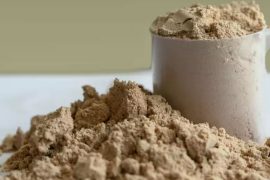Polycystic ovary syndrome (PCOS) is characterized by excessive androgen production, causing ovarian cyst formation and various symptoms like menstrual irregularities, weight gain, acne, and mood swings. Individuals with PCOS may experience insufficient levels of inositol, a sugar compound crucial for various bodily functions. When insulin utilization is compromised, so is inositol utilization, potentially depleting inositol stores. This depletion could exacerbate PCOS symptoms, highlighting the importance of maintaining adequate inositol levels for managing the condition effectively.
Buckwheat flour:
Buckwheat flour is indeed a fantastic alternative to traditional wheat flour, particularly for those following a gluten-free diet or looking for diverse nutritional benefits. Buckwheat is rich in fiber, providing digestive health benefits, and it’s a good source of plant-based protein, making it especially valuable for vegetarians and vegans. Additionally, it contains antioxidants like rutin, which may help protect against inflammation and chronic diseases. Its nutty flavor adds a unique taste to baked goods and other dishes, making it a versatile choice for cooking and baking.
Cabbage:
Cabbage is indeed a powerhouse of nutrients with numerous health benefits. Its anti-inflammatory properties can help alleviate inflammation throughout the body, contributing to overall well-being. Additionally, cabbage is rich in fiber, which promotes healthy digestion by aiding in regular bowel movements and supporting gut health. It’s also packed with essential vitamins, including vitamin C, which boosts the immune system and aids in collagen production for healthy skin, and vitamin K, important for bone health and blood clotting. Furthermore, cabbage contains folate, a B-vitamin crucial for cell division and DNA synthesis, making it a valuable addition to a balanced diet for overall health and wellness.
Citrus fruits:
Citrus fruits like oranges, lemons, and grapefruits, as well as melons such as cantaloupe and honeydew, are excellent sources of vitamin C, flavonoids, and fiber. Vitamin C is essential for immune function, collagen production, and antioxidant activity, helping to protect cells from damage caused by free radicals. Flavonoids, found abundantly in citrus fruits and melons, have antioxidant properties that further support overall health and may reduce the risk of chronic diseases. Additionally, the fiber content in these fruits aids digestion, promotes satiety, and helps regulate blood sugar levels. Plus, their natural sweetness makes them a delicious and healthy option to satisfy sugar cravings without compromising on nutrition.
Beans:
Beans serve as an exceptional dual-purpose ingredient, providing both protein and fiber, making them invaluable for those seeking a gluten-free carbohydrate option. Incorporating beans into daily meals, particularly in soups or salads, offers a nutritious and satisfying addition to the diet. Their protein content caters to the needs of vegetarians and vegans, while the fiber supports digestive health, aids in blood sugar regulation, and fosters satiety, assisting in weight management. Whether it’s black beans, chickpeas, lentils, or any variety, beans elevate the nutritional profile of meals, offering versatility, flavor, and affordability for those aiming for a balanced and gluten-free dietary approach.
Nuts:
Nuts are indeed a powerhouse of benefits and make for an excellent, nutritious snack choice. Packed with healthy fats, protein, fiber, vitamins, and minerals, nuts offer a range of health benefits, including reducing food cravings and promoting satiety. The combination of protein, fiber, and healthy fats in nuts helps to keep hunger at bay, making them a satisfying snack option that can aid in weight management and prevent overeating. Additionally, the nutrient density of nuts provides a boost of energy and supports overall health, including heart health, brain function, and blood sugar regulation. Incorporating a variety of nuts into your diet can contribute to a balanced and wholesome approach to snacking and nutrition.
Incorporating these foods into your daily diet can help increase your inositol intake and support overall health, particularly for managing PCOS symptoms. Additionally, maintaining a balanced diet rich in fruits, vegetables, lean proteins, and healthy fats can further optimize your nutritional status and improve PCOS management. Always consult with a healthcare professional or registered dietitian before making significant changes to your diet, especially if you have PCOS or any other medical condition.
Disclaimer:
The information contained in this article is for educational and informational purposes only and is not intended as a health advice. We would ask you to consult a qualified professional or medical expert to gain additional knowledge before you choose to consume any product or perform any exercise.







